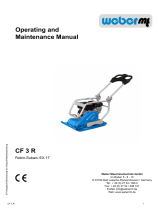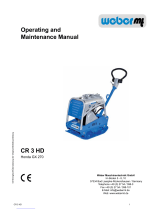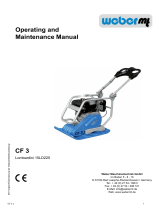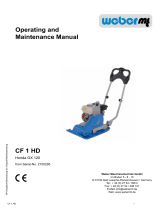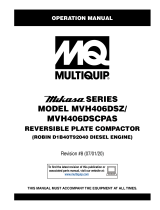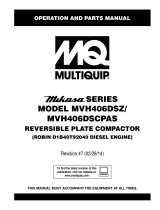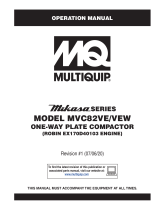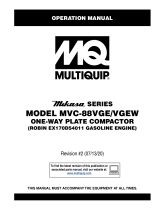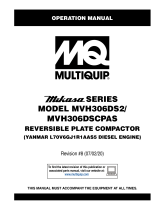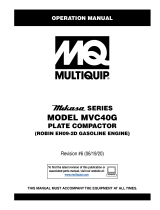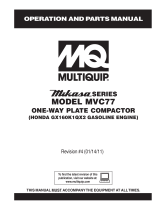Page is loading ...

CR 2 R 1
CR 2 R
Robin-Subaru EX 17
0616 /englisch/Übersetzung der Original-Betriebsanleitung
Operating and
Maintenance Manual
Weber Maschinentechnik GmbH
Im Boden 5 – 8, 10
D-57334 Bad Laasphe-Rückershausen / Germany
Tel.: +49 (0) 27 54 / 398-0
Fax: +49 (0) 27 54 / 398-101
E-mail: [email protected]
Web: www.webermt.de

2 CR 2 R

CR 2 R 3
Table of contents
Introduction 4
Safety guidelines 5
Graphic presentation 9
Device description 10
Technical data 11
Activities prior to starting work 13
Starting 15
Compacting 16
Shutting down 16
Maintenance overview 17
Maintenance work 18
Operating fluids and fill levels 19
Troubleshooting 19
Storage 20
Contact addresses 23

4 CR 2 R
Introduction
This operating and maintenance manual is designed to facilitate familiarization with your soil
compactor, and to enable you to maintain the compactor and use it for its intended purpose.
When complying with the instructions in the operating and maintenance manual you help
avoid hazards, reduce repair and downtime costs, and increase the reliability and service life
of your compactor.
This operating and maintenance manual must always be available at the implementation site
of the soil compactor.
If necessary you can obtain additional information from your authorized WEBER dealer,
or you can obtain information from one of the contact addresses on the last page.
You can obtain information on the assembled Honda gasoline engine at www.robin-europe.de.
The valid conformity declaration is enclosed with every machine delivery.

CR 2 R 5
Safety guidelines
General
All safety instructions must be read and complied with, non-compliance results in
– Danger to life and limb of the user
– Impairments to the machine or other property.
In addition to the operating manual, the accident-prevention regulations in the country where
the appliance is used must be complied with.
Intended use
The soil compactor should only be used if it is in a technically faultless condition, as intended,
in a safety-conscious and hazard-conscious manner, in compliance with the instructions in
the operating manual. Malfunctions that impair safety must be eliminated without delay.
The CR 2 R soil compactor is designed exclusively for compacting
– Sand
– Gravel
– Crushed rock
– Semi-cohesive mixed material
– Concrete paving stone
– Asphalt.
Any other use of the soil compactor is considered to be improper use for which the owner
shall be exclusively responsible. All liability is rejected if damage occurs due to non-compliance
with this provision. This risk is borne solely by the user.
Easily foreseeable misuse
Any use for which the machine is not intended.
Operation
Soil compactors are only permitted to be operated by suitable persons of or above the age of 18.
Personnel must be instructed in how to guide the compactor by the owner or by the owner’s
assigned personnel.
The machine operator must comply with traffic regulations. If instructions that affect safety
are given by third parties, then the operator must be authorized to reject these instructions.
Protective equipment
This machine is capable of exceeding the permissible sound level of 80 dB(A). The owner might also
face additional dangers when using the machine. Precautionary action must, therefore, be taken.
Unauthorized persons are forbidden from being in the area of the soil compactor during the com-
pacting process.
Protective equipment includes:
Hearing protection
Hard hat
Safety shoes
Protective gloves

6 CR 2 R
Maintenance and repair work
Only use original Weber spare parts to ensure reliable and safe operation for maintenance or
repair work.
Hydraulic hose lines must be checked at regular intervals in accordance with standard engineering
practice, or they must be replaced at appropriate intervals, even if no signs of safety-relevant
defects are present.
Adjusting tasks, maintenance tasks, and inspection tasks must be carried out on schedule as
specified in this operating and maintenance manual. These activities should only be executed
by instructed personnel.
For repair, service, or inspection work the engine of the compactor must be safeguarded against
unintentional starting.
All pressurized lines, particularly hydraulic lines and lines of the injection system of the drive motor
must be depressurized before performing maintenance or repair tasks.
For maintenance and repair tasks the compactor must be parked on a level and stable substrate
and must be secured from rolling off or tipping over.
Heavy components and assemblies must be secured to and lifted by hoisting machines that can
bear their weight when they are replaced. Ensure that no hazard is caused by raising components
or assemblies.
Do not position yourself or work under suspended loads.
Operation under difficult conditions
Never inhale the exhaust gas; it contains carbon monoxide, a colorless and odorless gas that
is extremely hazardous, which, if inhaled even briefly, can cause unconsciousness and death.
Therefore, never operate the engines in enclosed areas or in areas that are poorly ventilated
(tunnels, caves, etc.). Exercise particular caution when operating the engine in the vicinity of
people and livestock.
Operation
Prior to starting work the owner of the compactor must be familiar with the work environment.
The work environment includes obstacles in the work and traffic area, the bearing capacity of
the ground, as well as the necessary safeguarding of the construction site in the area adjacent to
public traffic; and it includes compliance with traffic regulations.
The soil compactor should only be operated when the protective fixtures are mounted. The protective
fixtures must all be in functional condition.
At least once per shift the compactor must be checked for apparent defects. If there are apparent
defects then operation of the compactor must be stopped immediately, and the responsible person
must be informed. Prior to restarting, compactor malfunctions that have occurred must be corrected.
Always maintain adequate clearance to the edges of pits and embankments.
Do not drive at ninety degrees to slopes to prevent the compactor from tipping over.
After work has been concluded secure the compactor in accordance with statutory regulations,
particularly in the area of public traffic surfaces.
If lubricating oils and fuel come into contact with skin, they can cause skin cancer. Upon contact
with the skin, clean affected skin with suitable cleaning agent without delay.

CR 2 R 7
Inspection
Compactors must be inspected in accordance with the corresponding implementation conditions
and operating conditions, as needed; however an inspection to ensure operationally safe status
must be performed by an expert at least once a year. The results of the inspection must be recorded
in writing and must be stored at least until the next inspection.
Cleaning work
Prior to cleaning the compactor with a high-pressure cleaner, protect all accessible energized
switches, cable connections, etc. against water penetration by masking them off.
Cleaning tasks should only be executed in areas that are suitable and have been approved for
this purpose (oil separator amongst others).
Disposal
All operating fluids and auxiliary materials must be disposed of in an environmentally-compatible
manner in accordance with country-specific regulations.
Important information for operating and maintenance personnel is marked by pictograms.
Warning against irritants or materials hazardous to health
Warning against a hazardous place
Warning against a suspended load
Wear ear protection
General regulation
Environmental protection
Hard hat
Safety shoes
Protective gloves

8 CR 2 R
3
4
6
2
4
57
8
10
1
Graphic presentation
Overall view CR 2 R
1 Engine
2 Drive lever
3 Manual guidance rod
4 Lifting ring
5 Base plate
6 Protective frame
7 Exciter
8 Gas lever
9 Hearing protection (sticker)
10 Undercarriage

CR 2 R 9
Device description
The CR 2 R compactor is used for road building and landscaping compaction tasks.
Drive
The unit is propelled by an air-cooled Robin-Subaru gasoline engine.
Force is transferred to the exciter mechanically via a V-belt.
Operation
Start the Robin-Subaru gasoline engine with the attached reversing starter.
After starting, vibration is switched on via the centrifugal clutch attached to the engine.
Use the gas lever to vary the engine speed between idle and full throttle.
Forward and reverse is variably controlled via the handle attached to the manual guidance rod.

10 CR 2 R
Technical data
CR 2 R
Weight
Operating weight CECE in kg (basic device) 132
Dimensions
Overall length (in mm) 1079
Overall width (in mm) 450
Height with folded manual guidance rod (in mm) 1079
Base plate length (base in mm) 320
Pressure surface (in mm) 450 x 320
Drive
Engine manufacturer Robin-Subaru
Type EX 17
Performance at operating speed in accordance
with ISO 3046-1 (kW) 3.1
Combustion process 4-stroke gasoline
Operating rpm 3350
Operating speed (ground-dependent in m/min) 14
Incline capacity (ground-dependent in %) 35
Vibration
System Two-wave vibrator
Drive concept Mechanical
Frequency (in Hz) 100
Centrifugal force (in kN) 25
CR 2 R
Noise emissions in accordance with 2000/14/EC
Sound pressure level LPA ascertained in accordance
with EN 500, in dB (A) 95
Sound power level LWA ascertained in accordance
with EN ISO 3744 and EN 500, in dB (A) 107
Vibration values
Root-mean-square acceleration value for
hand-arm vibration ascertained in accordance
with EN 500 in m/s² 4.9
In accordance with directive 2006/42/EC,
complying with the vibration values is the
owner’s responsibility.

CR 2 R 11
2
1
3 4
56
1 Description 2 TYPE
................................................... ...................................................
3 Serial number 4 Year of construction
................................................... ...................................................
5 Mass 6 Rated power kW
................................................... ...................................................

12 CR 2 R
1
1
2
1
1
2
1
2
Transport
Fit the crane hook into the ring (1) and lift the machine
onto the desired means of transport.
Only use lifting machines with a minimum bearing
capacity of 300 kg.
Do not step under suspended loads.
Transport with hand truck
Unlock the retaining pin (1).
Pivot the hand truck (1) under the base plate (2).
Arrest the manual guidance rod (1) with the spring bolt (2).
Activities prior to starting work
When transporting the soil compactor on a vehicle,
secure it with suitable restraints.
Arrest the manual guidance rod (1) with the spring bolt (2).

CR 2 R 13
1
1
1
Adjust the desired work height of the manual guidance rod
with the set screw (1).
Adjusting the manual guidance rod
Open and remove the gas cap (1), check the level, if
necessary top off to the lower edge of the filler neck
with clean fuel in accordance with the specification.
The correct oil level is between the min. and max. marks.
Checking the engine oil level
Pull the oil dip stick (1) out of the crankcase.
Check the fuel level
Insert the oil dip stick in the oil filler neck, but do not
screw it in.
For work at the fuel system, have a suitable fire-
extinguishing agent at the ready.
Fire, naked light, and smoking is forbidden!
max.
min.

14 CR 2 R
1
1
2
1
2
Starting
Bring the gas lever into full-throttle position.
Check the hydraulic oil level when the machine is at operating
temperature. The correct oil level is reached when the oil is in
the middle of the view glass.
Check the hydraulic oil level
Installing the protective mat
Fasten the protective mat with holder, screws, spring-lock
washers and nuts on the base plate front and rear.
Ensure that the protective mat rests under the base plate.
Turn the short-circuit button (1) to the “ON” position.
Slide the choke lever (1) to the left (close).
Open the fuel cock (2).
After the engine has warmed up, slide the choke lever to
the right (open).
Slowly tighten the handle (1) of the reversing starter (2)
until resistance is noticeable.
Allow the handle (1) to glide back into the initial position, and
then forcefully and completely pull it through with both hands.

CR 2 R 15
1
1
1
1
1
1
Shutting down
Compacting
Control drive speed and direction of travel with the
handle (1).
Bring the gas lever (1) into full-throttle position.
Only run machine within reach of the manual guidance
rod.
Bring the gas lever into idle position.
Close the fuel cock (1).
Turn the short-circuit button (1) to the “0” – OFF – position.
Completely empty the water tank if there might be a frost.
During breaks – even if they are short – the machine
must be shut down.
Parked devices that represent an obstacle must be
safeguarded against through conspicuous measures.

16 CR 2 R
Maintenance overview
The regulations of the engine manufacturer must be complied with in addition to the above
maintenance overview!
Work must be carried out using regulation tools, and the operating and maintenance manual
must be complied with for all work.
All maintenance work: select a collection vessel that is large enough to prevent oil from spill-
ing onto the ground. Dispose of waste oil in an environmentally friendly manner (regulation
on waste oils).
Dispose of oils, greases, cloths soaked in oil, and replaced parts with oil on them in an envi-
ronmentally friendly manner.
If lubricating oils and fuel come into contact with skin, they can cause skin cancer. Upon contact
with the skin, clean affected skin with suitable cleaning agent without delay.
If accessible during maintenance, check the condition and stability of all screws.
Maintenance interval Maintenance point Maintenance activity
After the first
25 operating hours
Engine – Change the engine oil
– Re-tighten all accessible
threaded connections
Every 8 operating
hours / daily
Air filter – Clean air filter insert,
check for damage,
replace if necessary
Every 50 operating
hours / every six months
Engine – Change the engine oil
– Change the fuel filter
– Change oil filter
Every 150 operating
hours / every year
Transmission – Change oil
Exciter – Change oil

CR 2 R 17
1
2
1
1
Maintenance work
Remove the oil drain screw (2) and drain oil completely.
When working in the area of the engine compartment
there is a danger of being burnt!
Screw the oil drain screw back in and fill the engine with
oil as specified.
Use an oil dip stick to check the oil quantity.
Unscrew dip stick (1).
Clean / change air filter cartridge
Unscrew the air filter cover (1).
Remove the air filter insert (1) from the air filter enclosure.
Clean air filter insert as specified by the engine manufacturer
if there is damage or if it is extremely dirty.
Only drain engine oil when at operating temperature.

18 CR 2 R
1
1
1
Changing the oil in the exciter
Remove the oil drain screw (1) and drain oil.
To fill – tilt the machine slightly and fill with fresh oil through
the drain opening in accordance with the fill level table.
Checking the V-belt
Remove the V-belt guard (1).
Check the V-belt (1) for cracks, damaged flanks, and wear.
If there is excessive wear – replace the V-belt as specified
in the repair manual.
Select a collection vessel that is large enough to pre-
vent oil from spilling on the ground. Dispose of waste
oil in an environmentally friendly manner (regulation on
waste oils).
Wipe up / off oil slick and oil residue and dispose of
fuel-soaked cleaning cloths in an environmentally re-
sponsible manner.

CR 2 R 19
Troubleshooting
Operating fluids and fill levels
Assembly Operating material Quantity
Summer Winter CR 2 R
Quality
Engine
Engine oil SAE 10 W 40 0.6 l
(– 10 ~ + 50 °C)
API – CD CE-CF-CG
or SHPD
or CCMC – D4 – D5 – PD2
Fuel tank Unleaded gasoline 3.6 l
Vibrator Fully-synthetic transmission fluid 0.5 l
API GL-5/GL-4
First filling Fuchs Titan
SINTOPOID
LS SAE 75W-90
Water tank 14 l
Transmission Transmission fluid DEXRON II-D-ATF As necessary
First filling
Fuchs Titan ATF 3000
or equivalent
Fault Possible cause Remedy
Soil compactor
does not start
Operating error Execute the start
process as prescribed
Lack of fuel Check the fuel level
Fuel filter fouled Change the fuel filter
Air filter fouled Clean / change
air filter cartridge
No vibration /
no forward motion
or insufficient
forward motion
Vibrator V-belt
defective
Change vibrator V-belt
Soil compactor
does not switch
Wrong hydraulic oil
level in the manual
guidance rod
Check oil level
Correct oil level

20 CR 2 R
Actions to be taken before long-term storage (longer than 1 month)
Entire soil compactor – Clean thoroughly
– Check watertight
– If there are leaks, correct defects
Fuel tank – Empty fuel and fill with clean fuel
up to the lower edge of filler neck
Engine – Check oil level, if necessary
fill to upper oil-level mark
– Check air filter, clean,
replace if necessary
– Check fuel filter,
change if necessary
All bare parts / gas lever / accelerator
control cable / fastening bolts
–Oil / grease
If the machine is to be stored for longer than six months, then contact the Weber service
organization to discuss additional measures.
/

